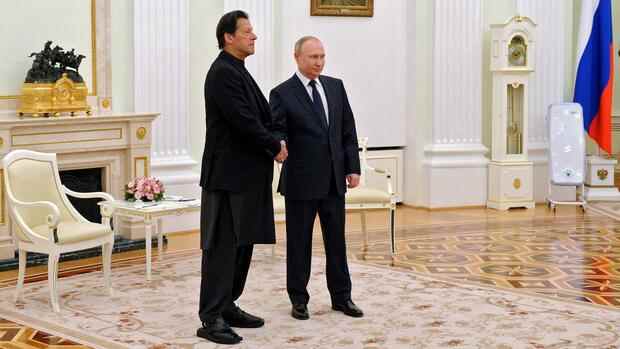Bangkok It only took a few hours after the order to attack Ukraine was given before the first foreign head of government, Vladimir Putin, shook hands in front of the cameras. Pakistan’s Prime Minister Imran Khan arrived in the Kremlin on Thursday afternoon for the meeting – and thus offered the Russian President the opportunity to present himself as a statesman who is still in demand.
Putin returned the favor for the symbolic images with an unusually warm welcome: unlike his European counterparts Emmanuel Macron and Olaf Scholz, Khan did not have to sit at a meter-long table. He was allowed to sit at a living room table, just an arm’s length away from the Kremlin chief.
Khan’s visit to Moscow, which was primarily intended to deal with cooperation in the energy sector, had been planned for weeks. But the fact that the head of government from South Asia stuck to the friendly visit to Putin despite the invasion of Russian troops in Ukraine sends a clear signal: In Khan’s part of the world, Putin is still a respectable conversational partner, despite his aggression in Europe.
The state visit immediately at the beginning of the war shows how difficult it is for the West to actually isolate Russia internationally. At least that’s the plan formulated by US President Joe Biden: “We will ensure that Putin will appear as a pariah on the international stage,” said the Democrat in response to the invasion of Ukraine.
Top jobs of the day
Find the best jobs now and
be notified by email.
But in Asia, hardly any major state seems willing to follow the Americans and Europeans in ostracizing the Russian president. It’s not just China that tolerates Russia’s actions more or less uncritically. In India – a close partner of Moscow since Soviet times, which obtains a large part of its armaments from Russia – Prime Minister Narendra Modi called for an end to the violence. However, the politician did not utter a condemnation of the attack.
Hardly anyone in Asia goes along with sanctions
Within the Southeast Asian state alliance Asean, too, there were mainly tentative statements in which the governments expressed their concerns – without naming Russia as the aggressor. Thailand said it would support the search for a “peaceful solution through dialogue.” In the abstract, Singapore and Indonesia condemned any form of violation of state sovereignty.
The government in Jakarta, which currently holds the G20 presidency, called for the war to be ended immediately – but ruled out joining the western sanctions against Russia in the short term: “We will not blindly follow the steps of other countries,” said the Foreign Ministry the fourth most populous country in the world. One wants to make a decision that is “based on our own interests,” it said in Jakarta. So far, among Asia’s major economies, only Japan and South Korea have agreed to implement punitive measures against Russia.
>> Read here: With these sanctions, the world is responding to Russia’s aggression
There are many reasons why many Asian countries are reluctant to deal with Russia. For some, the conflict seems too far away to want to get actively involved. Several authoritarian states in the region also have fundamental problems publicly addressing the misconduct of other autocrats – because they prefer to remain unmolested when they behave in a way that is open to criticism.
In the case of Indonesia, the desire to prevent the G20 from breaking up during its own presidency also plays a role.
Pakistan hopes for Russia as a business partner
However, the strategy of staying out of the conflict as much as possible also involves a risk: on the one hand, the countries of Europe and America threaten to alienate them – and could thus noticeably throw back plans for a deeper engagement by the West in the Indo-Pacific.
On the other hand, several countries in South and Southeast Asia have their own border conflicts – primarily with China. Zachary Abuza, a Southeast Asia expert at the National War College in Washington, warns that the People’s Republic could use Russia’s actions in Ukraine as a precedent for similar behavior in its own neighborhood.
On the other hand, nuclear power Pakistan – a long-standing US ally that has recently drawn ever closer ties to China – hopes to be able to open up Russia as a business partner. The events in the Ukraine are seen as a side issue.
Prime Minister Khan said on Russian state television on Tuesday that he sees no reason to refrain from approaching Putin in the conflict: “The reports of an imminent war do not concern us. We have a bilateral relationship with Russia – and we want to strengthen it.”
Immediately after arriving in Moscow, Khan proclaimed on the red carpet: “What a time to travel here. So much excitement!”
More on the Ukraine war:
Pakistani diplomats rated the meeting with Putin as a success. One of the central points on their agenda were the plans, which had been discussed for years, for a 1,100-kilometer gas pipeline called “Pakistan Stream”, which the country of 220 million people would like to build and operate together with Russia.
The government in Islamabad said on Thursday that 90 percent of the hurdles for the multi-billion project have been cleared. The gas pipeline, which will transport liquid gas from the coastal city of Karachi to power plants in the northern state of Punjab, is to become an “economic flagship project”.
More: India’s friendship with Russia threatens the West’s Asia strategy
